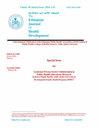Radosveta Dimitrova, Nora Wiium (Eds): Handbook of Positive Youth Development Advancing Research, Policy, and Practice in Global Contexts. Book review
IF 0.5
4区 医学
Q4 PUBLIC, ENVIRONMENTAL & OCCUPATIONAL HEALTH
Ethiopian Journal of Health Development
Pub Date : 2021-01-01
DOI:10.32921/2225-9929-2021-3-43-59-62
引用次数: 0
Abstract
The Concept of Positive Youth Development (PYD) was formed in the 1990s and combined the concepts of resilience and plasticity of human development, and an interest in the strengths of youth. This concept was proposed as a result of a reassessment of previous approaches, which were focused on the prevention of negative phenomena in the youth environment and teaching youth life skills. From a PYD perspective, it is necessary to build on the priority of developing the positive opportunities and strengths of young people through their participation in society. Over the past 20 years, the PYD program has been widely adopted by the international community. However, there is a lack of scientific data on the application of this concept in Kazakhstan.The review looks at the Handbook of Positive Youth Development. Advancing Research, Policy, and Practice in Global Contexts (editors: Radosveta Dimitrova and Nora Wiium), published in 2021 by Springer International Publishing. This book reveals the concept of PYD in a global context, which will allow a more effective approach to the issue of youth development in Kazakhstan, both from the side of health care and from the side of education and social developmentRadosveta Dimitrova, Nora Wiium主编:《积极青年发展手册:在全球背景下推进研究、政策和实践》。书评
积极青年发展概念(PYD)形成于20世纪90年代,结合了人类发展的弹性和可塑性概念,以及对青年优势的兴趣。这一概念是在重新评估以前的办法后提出的,这些办法的重点是防止青年环境中的消极现象和教授青年生活技能。从PYD的角度来看,有必要通过年轻人参与社会来发展他们的积极机会和优势。在过去的20年里,PYD项目被国际社会广泛采用。然而,缺乏关于这一概念在哈萨克斯坦应用的科学数据。检讨着眼于《积极青年发展手册》。在全球背景下推进研究、政策和实践(编辑:Radosveta Dimitrova和Nora Wiium),由施普林格国际出版社于2021年出版。这本书揭示了PYD在全球范围内的概念,这将允许从保健方面以及从教育和社会发展方面更有效地处理哈萨克斯坦的青年发展问题
本文章由计算机程序翻译,如有差异,请以英文原文为准。
求助全文
约1分钟内获得全文
求助全文
来源期刊

Ethiopian Journal of Health Development
PUBLIC, ENVIRONMENTAL & OCCUPATIONAL HEALTH-
CiteScore
0.80
自引率
0.00%
发文量
0
审稿时长
>12 weeks
期刊介绍:
The Ethiopian Journal of Health Development is a multi and interdisciplinary platform that provides space for public health experts in academics, policy and programs to share empirical evidence to contribute to health development agenda.
We publish original research articles, reviews, brief communications and commentaries on public health issues, to inform current research, policy and practice in all areas of common interest to the scholars in the field of public health, social sciences and humanities, health practitioners and policy makers. The journal publishes material relevant to any aspect of public health from a wide range of fields: epidemiology, environmental health, health economics, reproductive health, behavioral sciences, nutrition, psychiatry, social pharmacy, medical anthropology, medical sociology, clinical psychology and wide arrays of social sciences and humanities.
The journal publishes the following types of contribution:
1) Peer-reviewed original research articles and critical or analytical reviews in any area of social public health. These papers may be up to 3,500 words excluding abstract, tables, and references. Papers below this limit are preferred.
2) Peer-reviewed short reports of research findings on topical issues or published articles of between 2000 and 4000 words.
3) Brief communications, and commentaries debating on particular areas of focus, and published alongside, selected articles.
4) Special Issues bringing together collections of papers on a particular theme, and usually guest edited.
5) Editorial that flags critical issues of public health debate for policy, program and scientific consumption or further debate
 求助内容:
求助内容: 应助结果提醒方式:
应助结果提醒方式:


